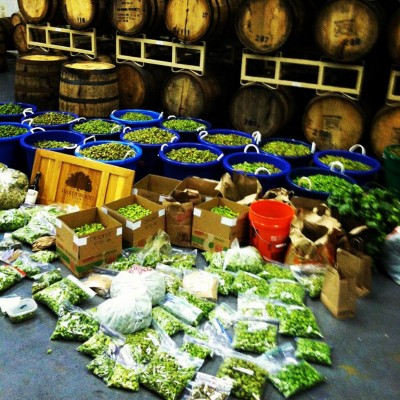By Jefferson Evans and Chuck Triplett
Hardywood Park isn’t the first brewery to have local folk offer to bring in hop cones from hop plants growing in their gardens and yards. And the brewery, like most, expressed gratitude but respectfully deferred. Issues such as consistency and quality control are no small thing and any time you vary from established processes, you create extra work and chances for gremlins to muck things up. But the powers that be, co-founders Eric McKay and Patrick Murtaugh, along with head brewer Brian Nelson, reflected a bit on the issue and finally came to the conclusion…why not. Why not let their enthusiastic customers, who are or would like to be hop growers, be more involved and feel even more invested in the brewery and its beers.
And, thus in 2011, the Community Hop Project was born. Simply put, the brewery hands out 1,000 rhizomes a year to interested individuals who can take one each of the three varietals available – Columbus, Cascade, and Centennial – and on the designated day the hop growers bring in their harvest of hop cones to the brewery which are then used to brew the Hardywood Reserved Series RVA IPA, a 7.0% IPA clocking in around 62 IBU’s and next scheduled to be released on Saturday, September 13 at 2pm at Hardywood Park brewery. This year the rhizomes were handed out at the end of March and the Facebook page for growers participating in the project includes quite a few pictures of freshly sprouting hop plants and trellis and similar structures growers have built for their new plants, along with questions and answers about how to best care for their growing hop vines. The group stands at 447 members as of 5/8/2014.
The first year, the amount of hops brought in was limited, hop plants do take a year or two to get established after all, but last year the beer was brewed on the big system and approximately 5% of the hops used for brewing the seasonal RVA IPA were hops brought in by members of the community. That number is expected to go up as more plants go into the ground and those already in continue to mature and produce greater and greater numbers of cones. Asked about whether Hardywood Park might go into large scale growing of hops themselves, head brewer Brian indicates that “maybe 5 years down the road” they may very well be looking at doing their own hop farming. The RVA IPA also utilizes hops from larger scale local hop growers such as Piedmont Hops which grows hops in Virginia and North Carolina, with the Virginia location being at Swift Creek Berry Farm and Greenhouse in Moseley, VA.
One person who has embraced the community hop project with great gusto is Jonathan Scott of Bon Air, VA. Jonathan tells me “I have been involved in the Hardwood Community Hopping Project for the past few years since the brewery began engaging the community through the project resulting in RVA/IPA. I think the Project is one of the best a brewery in Virginia has created to bring fans together and afford them the opportunity to learn more about the brewery and participate in the production of seasonal beer. The Project has grown every year and many growers like myself have expanded to grow even more hops for local breweries. I have gone from having two dozen plants the season before Hardywood opened to now growing over three thousand plants in order to provide hops to local breweries”. He goes on to describe how great it has been to have friends and family get excited and involved, to make so many new friends through the project, and to be a tangible part of Hardywood Parks philosophy to utilize locally sourced ingredients and support local businesses.
As Hardywood Park says on their website, “our goals with the Community Hopping Project are to make central Virginia a little greener, to increase the appreciation of one of beer’s core ingredients, to offer a fun, community oriented activity that gets more people involved in the creation of a local product, and to make the hops in one Richmond beer (RVA IPA) incomparably fresh”.
As with any brewery, having a consistent hop supply available is a major concern, and Hardywood Park, like many brewers, contracts out years in advance. The ever-growing number of breweries in the USA, along with the vagaries of weather (think drought and hail storms) and chance events (like a hop warehouse catching on fire), occasionally creates serious crunches in the hop supply, and having more hops grown locally is just another way of hedging against future shortages. In so many ways, people on all sides are finding the Community Hop Project a true win-win endeavor and look forwards to releases of the RVA IPA for many years to come.




